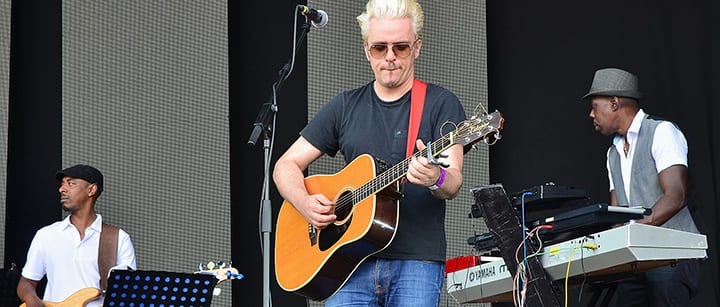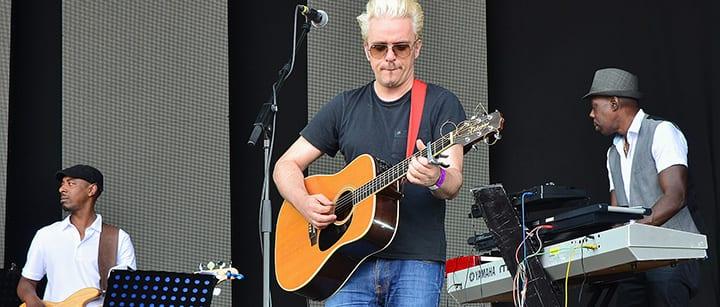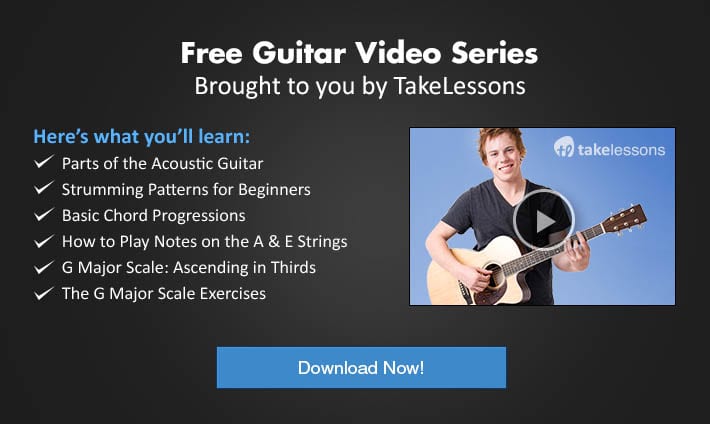 Is your guitar gear stage-ready? If you’ve been playing for a while and you’re ready to start performing, your set up might need some upgrades. Follow this guide from guitar teacher Nathan D. and enjoy rocking out…
Is your guitar gear stage-ready? If you’ve been playing for a while and you’re ready to start performing, your set up might need some upgrades. Follow this guide from guitar teacher Nathan D. and enjoy rocking out…
You’ve been playing guitar for a few years now and you’re starting to get pretty good. Your friends and family are impressed with how far you’ve come, but you’re not content to just be a casual player. You want to take your playing to the next level. And that means upgrading your gear.
There’s a lot of gear out there, and it can be overwhelming trying to figure out what you need and what you don’t. But don’t worry, we’re here to help. In this blog post, we’ll give you a rundown of the must-haves for the intermediate guitarist.
So whether you’re looking to upgrade your amp, your guitar, or your pedals, we’ve got you covered.
What Equipment is Needed for Guitar?
If you’re thinking about taking up guitar, you might be wondering what equipment you need. While it’s possible to find some used guitars and amplifiers for a reasonable price, there are also some essential accessories that you’ll need to purchase:
- A guitar. Obviously, this is the most important piece of equipment. If you’re just starting out, you might want to consider buying an acoustic guitar. They’re relatively inexpensive and easier to learn on than electric guitars.
- An amplifier. You’ll need an amplifier if you want to play electric guitar. Again, there are some great used options out there, but make sure you get one that’s compatible with your guitar.
- A strap. A strap is essential for playing electric guitar, as it gives you something to hold onto while you’re standing up. It also helps to keep your hands free so you can focus on playing.
- A pick. You’ll use a pick to strum the strings on your guitar. They come in different thicknesses, so try a few out to see which one feels comfortable for you.
- A tuner. A tuner is a handy tool that helps you keep your guitar in tune. There are both digital and analog tuners available, so choose the one that suits your needs best.
With these essential pieces of equipment, you’ll be ready to start learning how to play guitar like a pro!
Ready to start making a list of all the guitar gear you need? Guitar lessons can help. Learn more about all of the benefits of guitar lessons by watching the video below:
https://www.youtube.com/watch?v=WfZ64yEGPok
Which Guitar a Beginner Should Buy?
There are a lot of factors to consider when purchasing a guitar, especially if you’re a beginner. It’s important to find an instrument that is comfortable to play and suits your budget. If you’re just starting out, it might be tempting to buy the cheapest guitar you can find.
However, this can often lead to frustration, as low-quality instruments are often difficult to play and don’t stay in tune. It’s also important to choose the right size guitar. If you’re an adult with large hands, a child’s toy guitar is probably not going to be very comfortable.
On the other hand, a full-sized guitar may be too big for younger children or those with small hands.
Another factor to consider is the type of music you want to play.
If you’re interested in classical or Spanish-style guitar, then you’ll need a nylon-stringed instrument.
These guitars are typically more expensive than steel-stringed guitars, but they offer a mellower sound that is well suited to those genres. If you’re looking to play rock or country music, then a steel-stringed guitar is probably a better option. Ultimately, the best way to choose a guitar is to go to a music store and try out as many different instruments as possible until you find one that feels right for you.
Buying Guitar Gear to Motivate Yourself? Here are the Top Picks
So perhaps you’ve been playing steadily for a few months to years, and you’re taking this whole “guitarist” thing seriously. Maybe you now have a band, and want to start playing out. There’s plenty of necessities to get or upgrade guitar gear as you start to go a bit more pro, and countless sticker-shock options as well. What do you need to know before going on a crazy, card-maxing shopping spree?
Ideas For The Road
A floppy gig bag will need an upgrade, so definitely buy a hard-shell case to protect your instrument. Consider the hardships of packing your guitar into your tour vehicle and traveling. It will pay for itself after a hard drop out of a van door or trunk, or even a single pass through the TSA’s often brutal gauntlet.
Buy a few supplies for your case. I keep a spare string winder, a pack of strings, a tuner (or pitch pipe, as they don’t need batteries that can leak if left unchecked), and a few extra picks. A pen and some paper won’t hurt, either. You never know when you’ll have to trade info with a promoter and run out of business cards (bar napkins easily get thrown out).
If you live in dry climates, I shouldn’t even have to tell you to have a humidifier in your guitar case. However, if you’re going on tour or vacation, it’s not the first thing you might think to pack. You don’t know what the weather will be from state to state (or continent), so it’s worth the twenty dollar or more investment.
Suggestions For The Active Stage Rocker
Consider installing strap-locks onto your instrument, especially if you’re in an act that flails around a lot. Be aware of the current size of the strap screws in your instrument. You may be drilling a deeper or wider hole for larger screws to properly secure the locks. Have it done by a pro if you don’t want to potentially split your body apart (or ask a reliable carpenter friend).
It’s not worth putting strap-locks onto a guitar strap that will break at your next practice. Please don’t repair your straps with duct tape. If it looks shoddy, get a new one. Also, if you notice that your shoulder gets fatigued after wearing your guitar for an hour, immediately upgrade to a wider strap with some padding.
If you’re tired of pulling your cable from your amp (regardless of its length), become entangled with mic stands and bandmates, or have ever pulled your amp to have it fall directly onto pavement, you might be a candidate to go wireless. There are budget packages that run for only a couple hundred dollars or less, just check the reviews on your favorite retailers’ websites. It’s incredibly fun to run the full distance possible through or around your audience while playing, whether it’s an outdoor show or in a bar.
Playing With Power – High Powered Amps
Here’s the big one: your practice amp probably won’t cut it live. Even if a microphone and PA is used in conjunction with it, relying on a tiny, low-watt amp and/or stage monitors doesn’t always work out very well.
Don’t be the player on stage that insists on using a microphone on a 20 watt amp, constantly glaring at the poor sound guy, angrily shooting a finger repeatedly upward, and yelling to crank you up in the stage mix.
You’re going to need at least a couple hundred watts to be loud enough. If you can’t hear your playing while on stage with drums and other instruments (and actually want to play with a band), you’ll need a new, more powerful amp.
Prepare to shell out several hundred dollars to a grand (or more). Note the differences in buying an all-in-one versus a speaker cabinet setup and separate amplifier (or head unit). You can always upgrade the amp if you buy separate units, but in any case you can always upgrade the speaker(s) down the line. If you’re handy, you can also build your own speaker box with plans found online.
Small But Powerful Amps
Don’t rule out using a small yet powerful amp to power any speaker box, as my $300 200 Watt ZT Lunchbox (it’s the size of a lunchbox) is actually powerful enough to power my 4X12” Marshall cabinet. However, its built-in 6.5” speaker actually is enough for me in most small venues.
Bring your instrument to the store to try out different amps, don’t just go by reviews. You don’t want to pay return shipping on a 100 pound amp if you decide to buy online without even trying it in person. Your sound doesn’t need compromises, plus your wallet could take a big, non-refundable hit for a simple mistake.
When you purchase or construct a new, more powerful amplifier setup, you can always keep your little old amp for low-volume practice, or sell it to a beginner.
For more great amps check out this list from Music Skanner.
Last Words To You Rockers
My final, very important advice is have ear protection. Your ears are your most important organs as a musician. Tinnitus is not fun. I’m in my early thirties and I have already started developing it in my left ear, and sometimes it wakes me up at night. There’s plenty of options in foam, rubber, and silicone models that are under twenty dollars.
That being said (and hopefully heard), a wide assortment of guitar gear possibilities await you. Has some of that anxiety calmed of what to do next? I hope some of these suggestions help you out. You’re at an exciting stage of being a musician! Keep playing!
What to Do With Your Used Guitar Gear
When you’re done with your used guitar gear, there’s no need to leave it languishing in the back of a closet. There are plenty of easy ways to give it a new life.
Donate Old Guitar Gear
One option is to donate it to a local school or music program. This is a great way to support budding musicians and ensure that your gear gets put to good use.
Sell to a Music Store or Sell Guitar Gear Online
Another possibility is to sell it online or at a used music store. This can be a great way to recoup some of the money you invested in your gear, and it’s also a great way to find new homes for instruments and equipment that you no longer need.
Trade It
Are you looking for a new guitar or amplifier? See if anyone in your local music scene is interested in trading gear. This is a great way to get something new without spending any money.
Use Our Guitar Gear Guide to Help You On Your Journey
If you’re an intermediate guitarist who wants to take their playing to the next level, then upgrading your gear is essential. A better amplifier will give you more power and flexibility; a better guitar will allow you play the style of music YOU want to play; and better pedals will help YOU get the sound YOU want to achieve. So don’t wait any longer; start upgrading today and ask your guitar teacher for tips on what kind of gear is right for you!

Nathan D. teaches guitar, bass, drums, and more in North Wales, PA. His specialties include rock and heavy metal styles, but he teaches every genre. Learn more about Nathan here!
Photo by Andrew_D_Hurley
Suzy S.

